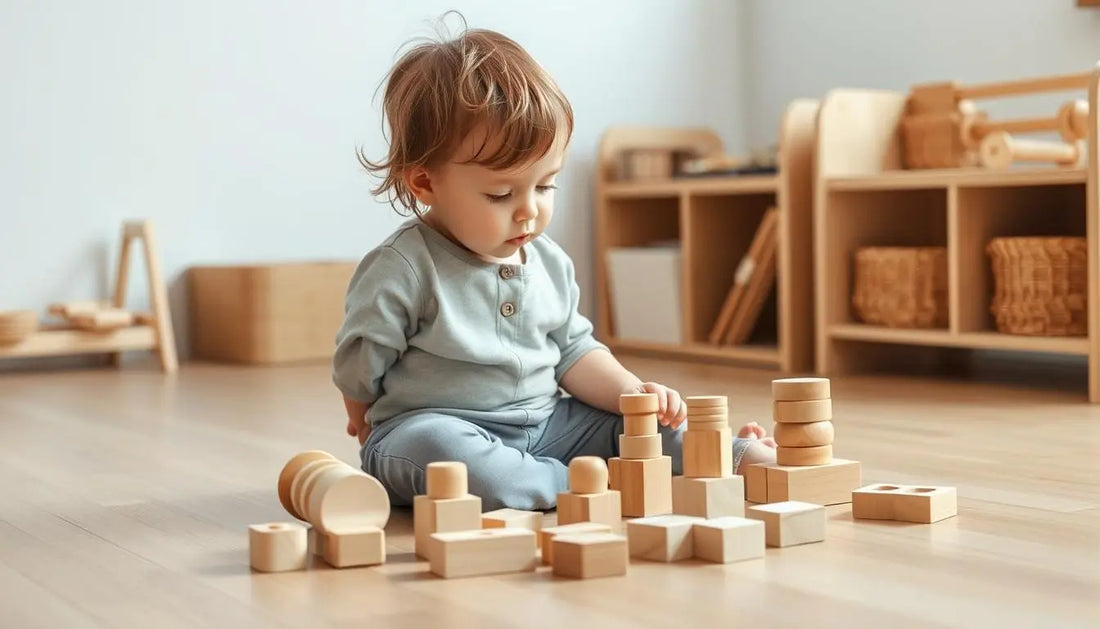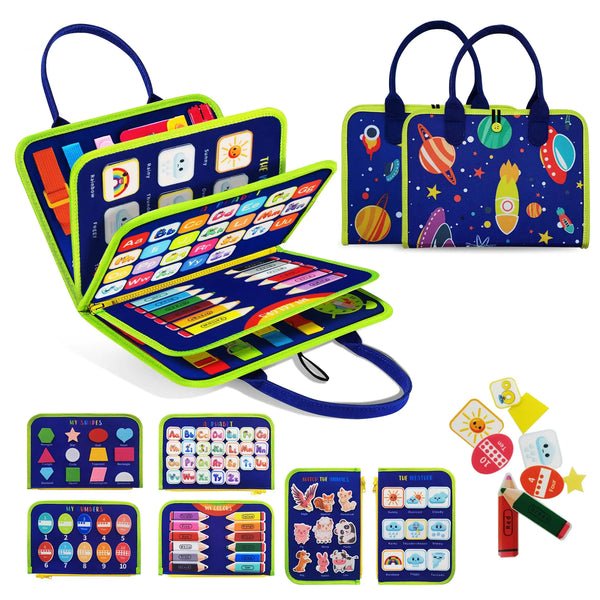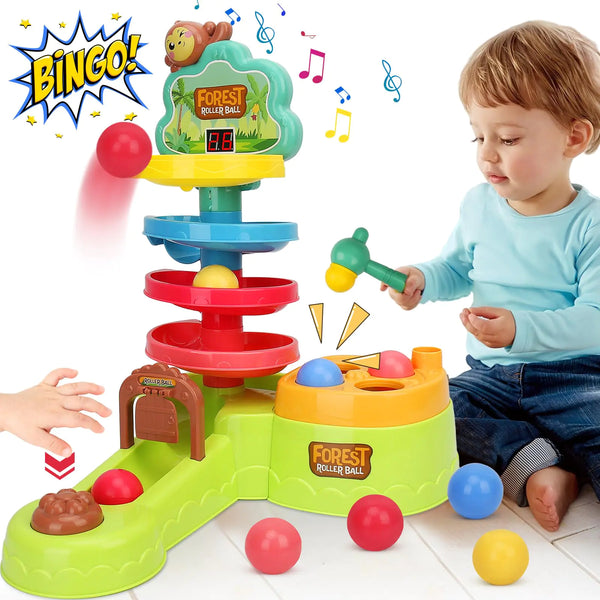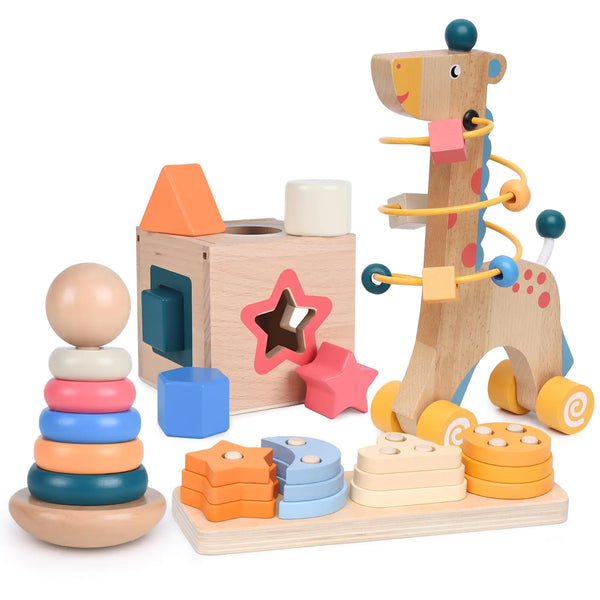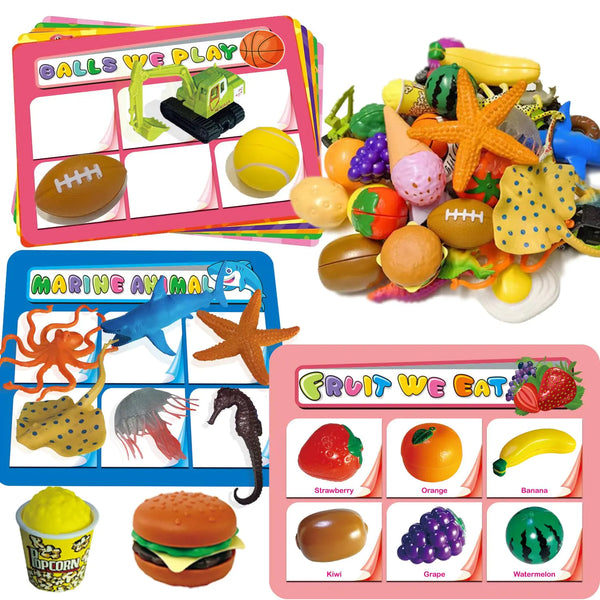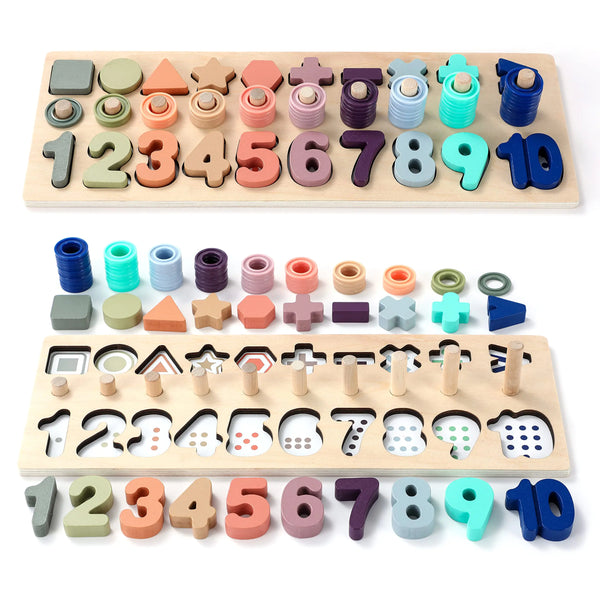The toys we choose for our children shape more than just their playtime—they influence how children learn, develop, and understand the world around them. Montessori toys for kids stand apart in their thoughtful design and profound developmental impact. Unlike conventional toys with flashing lights and automated sounds, Montessori toys engage children through simplicity, purpose, and hands-on exploration. In this guide, we'll explore why these special toys deserve a place in your child's play area and how they contribute to holistic development.

Core Principles of Montessori Education
Developed by Dr. Maria Montessori in the early 1900s, the Montessori method centers on the belief that children learn best through self-directed activity, hands-on learning, and collaborative play. This educational approach recognizes that children have an innate desire to learn and are capable of initiating learning in a supportive environment.
Key Montessori Principles
- Respect for the child as an independent learner
- Prepared environments that foster exploration
- Child-led learning at individual pace
- Hands-on learning with real materials
- Focus on developing concentration and order

Montessori toys align perfectly with these principles by offering children the opportunity to engage with materials that teach specific skills through repetition and self-correction. These toys encourage independence by allowing children to discover solutions on their own, building confidence and problem-solving abilities from an early age.
5 Key Benefits of Montessori Toys for Kids
Montessori toys aren't just beautiful additions to your child's play area—they're powerful tools for development. Here's how these thoughtfully designed toys benefit your child:

1. Foster Independence
Montessori toys encourage children to play and learn without constant adult intervention. Simple designs allow children to figure out how things work on their own, building confidence and self-reliance. This independence translates to other areas of life as children learn to dress themselves, prepare simple snacks, and solve problems independently.

2. Enhance Motor Skills
From grasping wooden blocks to threading beads, Montessori toys provide countless opportunities to develop both fine and gross motor skills. These activities strengthen hand muscles needed for writing, cutting, and other precise movements. The physical manipulation of objects helps children understand spatial relationships and improves hand-eye coordination.

3. Encourage Creativity
Unlike toys with predetermined functions, Montessori toys are often open-ended, allowing children to use them in multiple ways. A set of wooden blocks can become a tower, a road, or a zoo. This flexibility nurtures imagination and creative thinking as children invent new ways to play with the same materials.

4. Develop Cognitive Skills
Montessori toys often incorporate elements of math, science, and language in their design. Sorting activities develop categorization skills, puzzles enhance spatial awareness, and counting beads introduce mathematical concepts. These toys lay the foundation for academic learning through hands-on experience rather than abstract instruction.

5. Build Social Skills
While Montessori toys support independent play, they also foster collaboration. Children learn to share materials, take turns, and communicate about their discoveries. These interactions develop empathy, patience, and respect for others—essential social skills that benefit children throughout life.
Ready to support your child's development?
Discover our collection of carefully selected Montessori toys designed to nurture your child's natural development.
Choosing Quality Montessori Toys: A Buying Guide
Not all toys labeled "Montessori" truly align with Montessori principles. Here are key criteria to consider when selecting quality Montessori toys for your child:
Natural Materials
Look for toys made from natural materials like wood, cotton, wool, or metal. These materials provide rich sensory experiences, are more durable than plastic, and connect children to the natural world. Natural materials also offer authentic weight, texture, and temperature feedback that plastic cannot replicate.
Simple, Purpose-Driven Design
Quality Montessori toys have a clear purpose and teach specific skills. They should be free from unnecessary details and distractions. Each toy should focus on one concept or skill at a time, allowing children to master it before moving on to more complex challenges.
Open-Ended Play Value
The best Montessori toys can be used in multiple ways and grow with your child. Open-ended materials like blocks, scarves, or loose parts encourage creativity and can be incorporated into play at various developmental stages.

Reality-Based
Montessori toys should reflect reality rather than fantasy. Choose miniature versions of real objects, realistic animal figurines, and practical life tools sized for children's hands. These realistic toys help children connect play experiences to the real world.
Self-Correcting Features
Many Montessori materials are designed to be self-correcting, allowing children to recognize and correct their own mistakes. For example, a puzzle piece will fit only in its correct spot, or graduated cylinders will stack only in a specific order. This design encourages independent problem-solving.
Find the perfect Montessori toys for your child.
Please browse our selection of high-quality, natural Montessori toys that meet these essential criteria.
Top Montessori Toys by Age and Development Stage
Finding the right Montessori toys for your child's age and developmental stage is key to maximizing their learning potential. Here are our top recommendations organized by age group:
Montessori Toys for Infants (0-12 months)

Montessori Mobiles
These simple hanging mobiles with high-contrast patterns and shapes stimulate visual development in newborns. As babies grow, mobiles in different colors and made of natural materials continue to engage their developing senses.

Wooden Grasping Toys
Smooth wooden rattles, teething rings, and grasping toys help babies develop hand strength and coordination. These simple toys encourage reaching, grasping, and transferring objects from hand to hand.
Montessori Toys for Toddlers (1-3 years)

Shape Sorters
Wooden shape sorters help toddlers develop spatial awareness and problem-solving skills. These self-correcting toys teach shape recognition while strengthening fine motor coordination.

Stacking Toys
Rainbow stackers, nesting blocks, and stacking cups teach concepts of size, sequence, and balance. These versatile toys can be used for building, sorting, and creative play as children grow.

Threading Activities
Lacing cards, threading beads, and sewing frames develop fine motor skills and hand-eye coordination. These activities prepare children for more complex tasks, such as buttoning, tying, and eventually writing.
Montessori Toys for Preschoolers (3-6 years)

Counting and Math Materials
Number rods, counting beads, and number puzzles introduce mathematical concepts through concrete experiences. These materials help children understand quantity, sequence, and basic operations before moving to abstract math.

Language Materials
Sandpaper letters, movable alphabets, and object-matching cards support literacy development. These hands-on materials connect written language to sounds and meanings, preparing children for reading and writing.

Practical Life Materials
Child-sized tools for activities like pouring, transferring, and cleaning help children develop independence and care for their environment. These materials refine motor skills while teaching responsibility and practical abilities.
Find age-appropriate Montessori toys
Browse our complete collection of Montessori toys organized by age and developmental stage.
Frequently Asked Questions About Montessori Toys
Are Montessori toys safe for toddlers?
Quality Montessori toys from reputable manufacturers are designed with safety in mind. Look for toys made from non-toxic materials with smooth edges and finishes. Always check for age recommendations and supervise young children, especially with toys that may contain small parts. Our Montessori toys at EcoKidsBay meet or exceed safety standards for their recommended age groups.
Why are Montessori toys often made of wood?
Wood provides natural sensory feedback through its weight, temperature, and texture. Wooden toys are typically more durable than plastic alternatives and age beautifully with use. Natural materials like wood also connect children to the natural world and are generally more environmentally sustainable than plastic toys.
How many Montessori toys should my child have?
The Montessori approach favors quality over quantity. A few well-chosen toys that match your child's current interests and developmental needs are better than many toys that overwhelm. Consider rotating toys every few weeks to maintain interest and provide fresh challenges without cluttering your space.
What's the difference between Montessori toys and regular toys?
Montessori toys are designed with specific developmental goals in mind and typically feature natural materials, reality-based concepts, and self-correcting elements. They often focus on a single skill or concept at a time, unlike many conventional toys that may overstimulate with lights, sounds, and multiple features. Montessori toys encourage active engagement rather than passive entertainment.
Do I need to follow the Montessori method completely to use these toys?
Not at all! While these toys align with Montessori principles, they benefit all children regardless of educational philosophy. You can incorporate Montessori toys into any home environment to support your child's development. The key is providing opportunities for self-directed exploration and respecting your child's natural learning process.
Supporting Your Child's Natural Development
Montessori toys offer a thoughtful approach to play that respects children's innate desire to learn and grow. By providing simple, beautiful materials that engage the senses and encourage exploration, you're giving your child tools to develop independence, concentration, and a love of learning that will benefit them throughout life.
Remember that the most important element in your child's development is your loving presence and support. Montessori toys are wonderful tools, but your engagement—observing your child's interests, following their lead, and celebrating their discoveries—creates the foundation for joyful learning.
Begin your Montessori journey today
Explore our carefully curated collection of eco-friendly Montessori toys designed to support your child's natural development.


